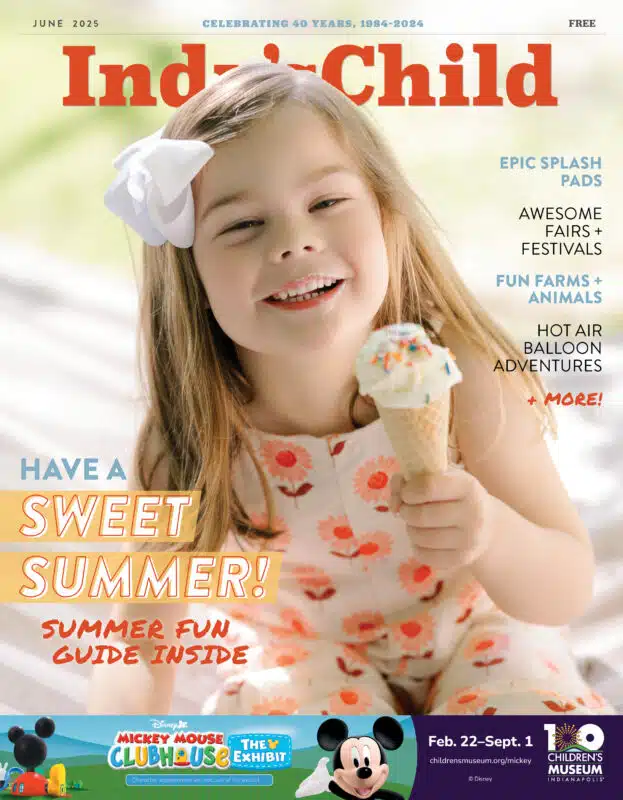We’re all told that it takes a village to raise a child, but what if the grandparents, aunts, uncles and cousins that make up your village don’t really understand what your family is going through?
That’s the dilemma that parents of children with autism often face when they go looking for support – but first must educate, dispel misinformation and provide a library of resources about their child’s diagnosis in an effort engage extended family.
“I think every parent who has a child with special needs is going to encounter some type of ignorance when they are discussing their child’s diagnosis,” says Bonnie Fisher, an autism resource specialist with Easterseals Crossroads and mom of a 5-year-old on the spectrum. “This Thanksgiving, my husband’s aunt told me, ‘She doesn’t look autistic.’ I feel that part of our job as a parent of a child with special needs is to advocate, and part of advocating for your child is educating other people.”
The key, of course, is to find a way to do this in a way that works for you. Talking openly about autism, providing simple resources and inviting family members to take part in events that are important to your family can help.
Talk about it
Keeping lines of communication open about your child’s diagnosis, including his or her progress and setbacks, is a good starting point, experts say. “You have to talk about it. You have to talk about what autism is, what autism means to your child and how autism impacts their life. What I’ve found is that most family members want to know and understand,” says Kelly Pence, senior autism ally with the Autism Society of Indiana and mom of two teenaged sons on the spectrum.
Pence also stresses that parents shouldn’t feel like they have to know everything about autism, especially early in their family’s journey. “If you’re fairly new to the diagnosis, you may not really understand it yourself or don’t know how to explain it, so it’s a struggle. I’m pretty adept in talking with people and opening up that conversation, but I wasn’t like that when my sons were little. We just tended to avoid things,” she says. “I know now that it’s okay to say to family members, ‘I don’t have all the answers. I’m still learning about autism, too, but here are some resources.”
The Autism Society of Indiana’s website (www.autismsocietyofindiana.org) offers a wealth of easy-to-understand information. Pence also notes that the organization’s autism allies, a statewide network of support personnel with personal experience with autism, are available to answer questions family members may have.
Extend an invitation
For those people who you would especially like to be a part of your child’s life, including them in activities related to autism, whether that’s a regular support group, fundraising walks or local special needs family nights, can help boost their familiarity and understanding of autism.
Easterseals Crossroads hosts an Autism Grandparents’ Support Group on the third Wednesday of each month from 5:30-7:30 pm. This is scheduled at the same time as the Parent Support Group, at the organization’s north side headquarters (4740 Kingsway Drive). “I think that grandparents benefit from hearing how other grandparents support their child in child rearing,” says Fisher. “For family members of individuals with an (autism spectrum disorder) diagnosis, having someone with similar experiences to talk with is very therapeutic.”
Pence says attending a support group can also help those who struggle to understand an autism diagnosis. “At a support group, extended family members might hear something explained in a different way that makes more sense to them,” she says. “Fellow parents are one of the best resources, so if you can manage to get grandma and grandpa to go with you to a support group, you’ll have a whole set of people who will help get them on board.”
Empower yourself
Of course, the time and energy needed to continually educate extended family members about autism may seem like too much. But experts say that parents are actually helping themselves in the long run when they do put forth this effort.
“I can say from experience that when your child is first diagnosed, you may feel like you have lost all control over the future of your child’s life,” Fisher says. “But by educating yourself and others and advocating for your child, you will gain so much confidence that you will no longer feel powerless.”
*The Easter Seals Crossroads Family Resource Center maintains a library of books related to autism that anyone is welcome to check out (see sidebar for Fisher’s top recommendations).
SIDEBAR
Recommended reading for helping family members understand autism
Autism Spectrum Disorders: What Every Parent Needs to Know by Alan I. Rosenblatt and Paul S. Carbone.
A basic overview of the diagnosis and available treatments
Neurotribes by Steve Silberman
The history of research on ASD and where it’s headed
The Verbal Behavior Approach: How to Teach Children with Autism and Related Disorders by Mary Barbera and Tracy Rasmussen
A basic outline of Applied Behavior Analysis (ABA)
I See Things Differently: A First Look at Autism by Pat Thomas
Explaining autism to children




[…] Giáo dục Các Thành Viên Gia Đình Mở Rộng Về Chứng Tự Kỷ […]